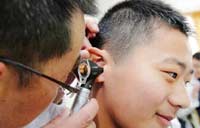No sandbox, no mud pies
But this lack of outdoor play is having a detrimental effect on Koriyama's children, both physically and mentally.
"Compared to before the disaster, you can certainly see a fall in the results of physical strength and ability tests - things like grip strength, running and throwing balls," says Toshiaki Yabe, an official with the Koriyama city government.
An annual survey by the Fukushima prefecture's board of education found that children in Fukushima weighed more than the national average in virtually every age group.
Five-year-olds were roughly half a kilogram heavier, while the weight difference grew to 1 kg for 6-year-old boys. Boys of 11 were nearly 3 kg heavier.
Hiraguri says that stress was showing up in an increase of scuffles, arguments and even sudden nosebleeds among the children, as well as more subtle effects.
"There are a lot more children who aren't all that alert in their response to things. They aren't motivated to do anything," he says.
Koriyama has removed decontaminated earth in public places, sometimes more than once, and work to replace all playground equipment in public parks should finish soon.
Yabe, at Koriyama city hall, says parental attitudes toward the risk of radiation may be slowly shifting.
"These days, instead of hearing from parents that they're worried about radiation, we're hearing that they're more worried because their kids don't get outside," he says.
But Hiraguri says things are still hard.
"I do sometimes wonder if it's really all right to keep children in Fukushima. But there are those who can't leave, and I feel strongly that I must do all I can for them."
Reuters


















